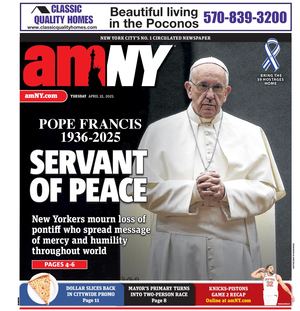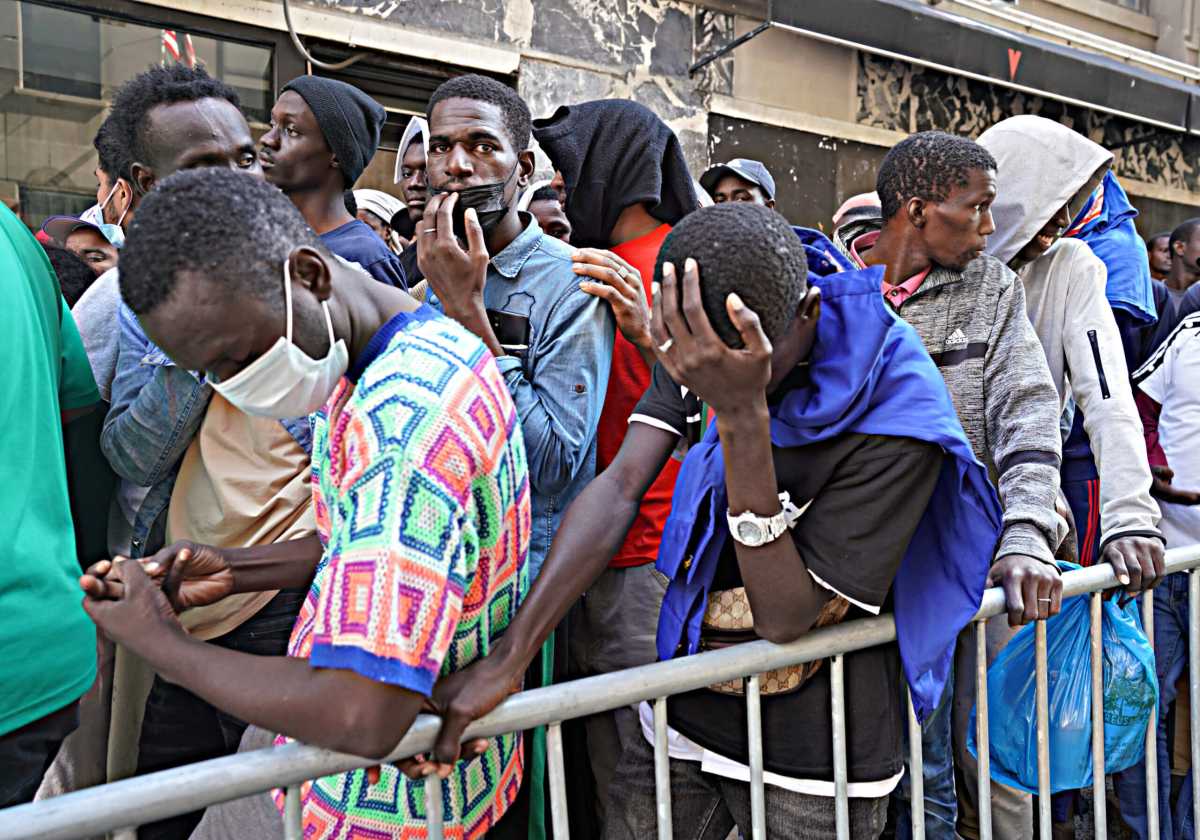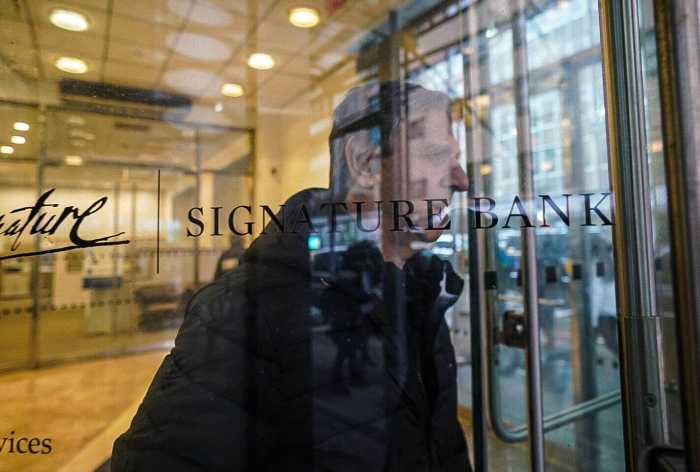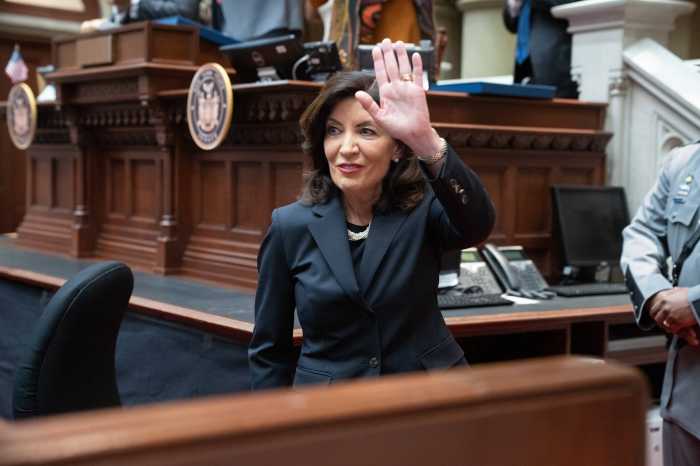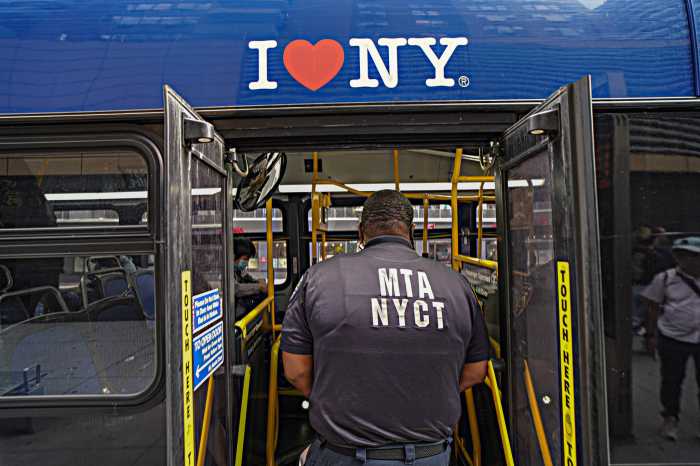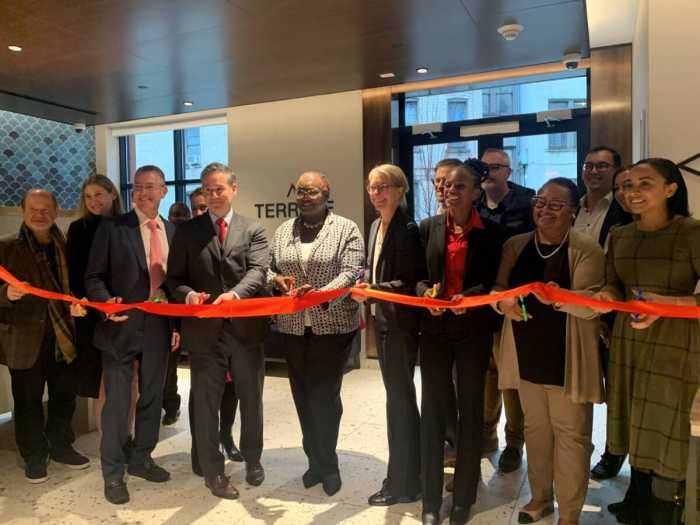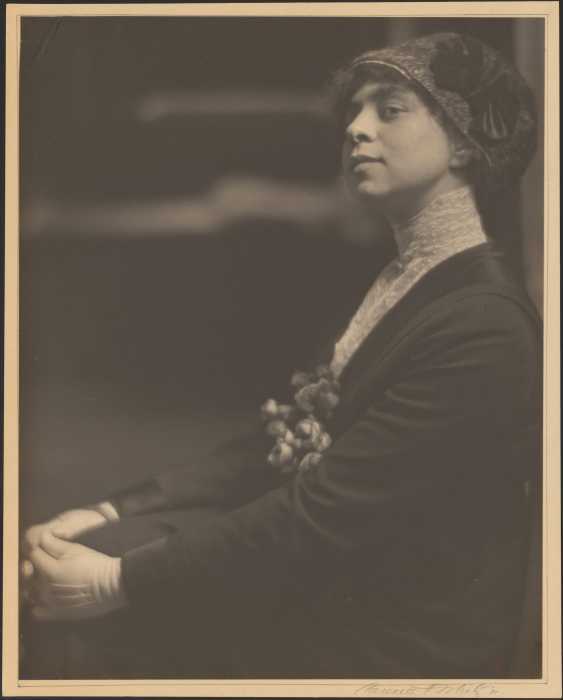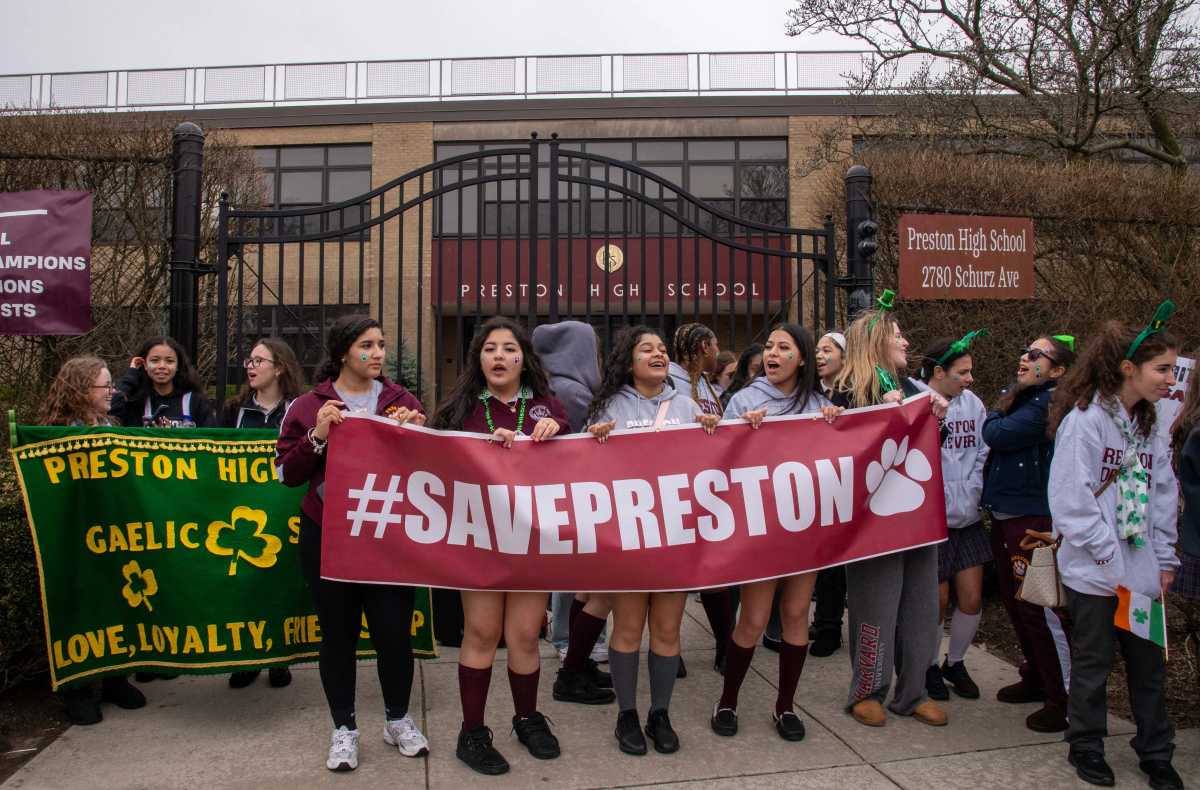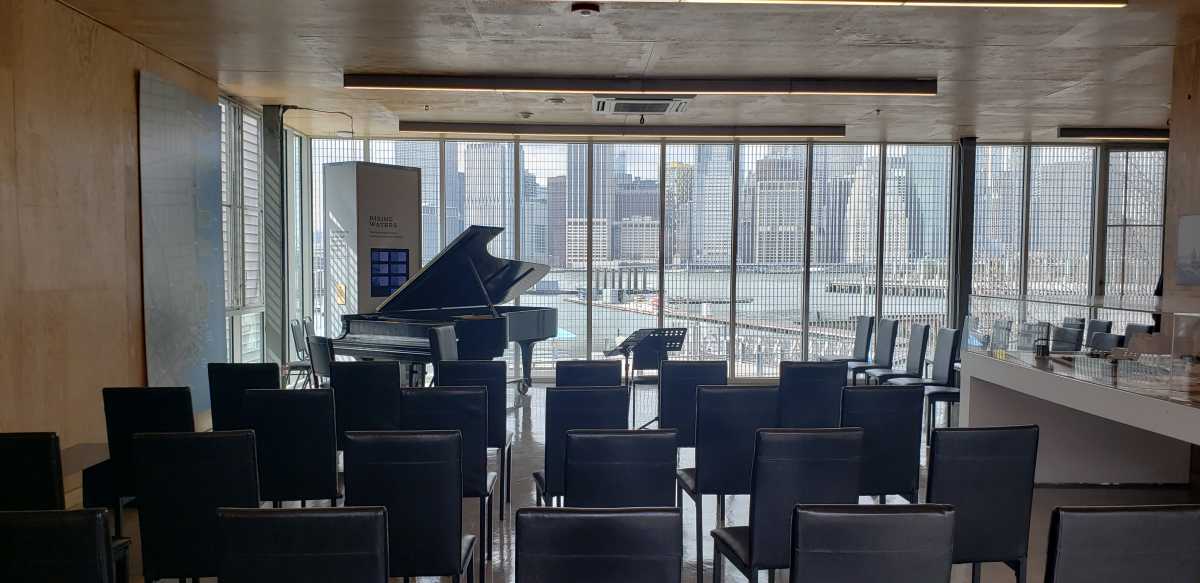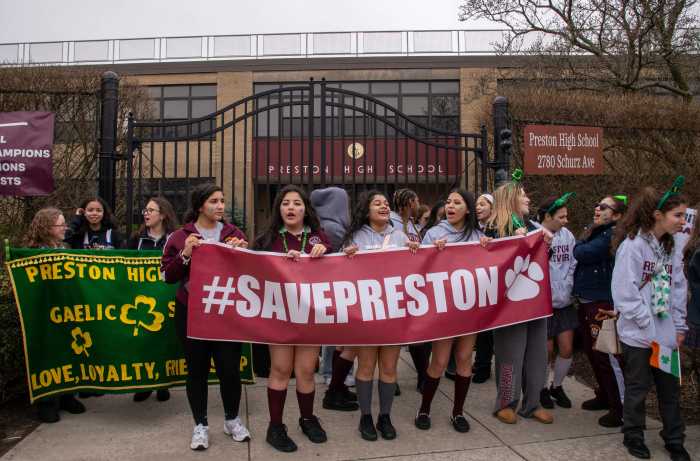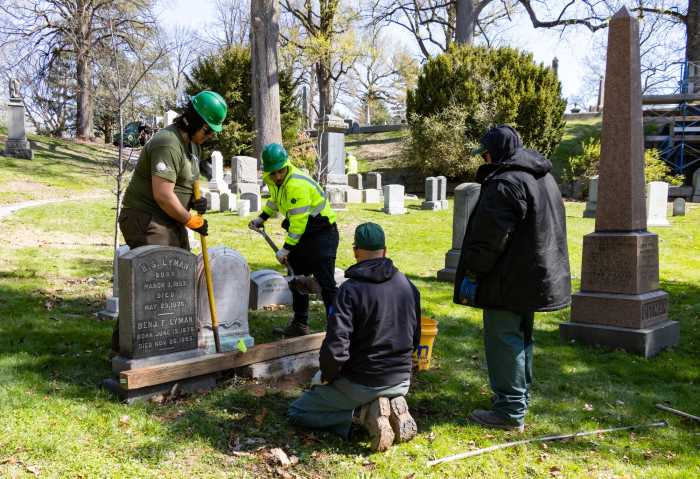Lawyers representing Gov. Kathy Hochul penned a letter on Tuesday to city leadership, in which they attempted to shift blame for the ongoing migrant crisis onto Mayor Eric Adams’ administration.
The missive marks a serious breach in the typically cordial relationship between Hochul and Adams, especially on the issue of asylum seekers, where the city and state have made significant efforts to present a unified front.
Tuesday’s letter, which was first obtained by the New York Times, promises that the state will continue aiding the city, which has seen over 100,000 migrants arrive since last spring, but lamented that the Adams administration has failed to utilize all the assistance Hochul’s administration has already provided.
“The State will continue to be a strong partner to the City and is committed to providing significant resources and support to, and advocacy on behalf of, the City and the arriving migrants,” the letter reads. “At the same time, the State expects that the city will fully utilize the space and other resources that the State has already offered or provided to the City.”
According to the letter — penned by Faith Gay of the law firm Selendy Gay Elsberg PLLC, outside counsel used by the Hochul administration — the state identified several locations that could collectively “provide temporary shelter to more than 3,000 migrants” as early as October of 2022, but the city failed to use those locations.
“To date, the City has ruled out several of these properties for reasons that do not relate to their suitability as shelters and has not indicated an intent to move forward on the others,” the letter reads. “The State, however, stands ready to assist with further review and preparation of these sites for use by the City.”
Those locations which the city has ruled out include the Brooklyn Armory Terminal in Brooklyn; The Roberto Clemente State Park gymnasium in the Bronx; The Riverbank State Park gymnasium and amphitheater in Manhattan; The Aqueduct Race track in Queens; and others.
For their part, City Hall reps said opening up state-owned space within city limits was not enough, and that the state should do more to shift the burden of the migrant influx towards other localities in the Empire State.
“Because this is such a significant crisis, we need more, including more space around the state and a statewide order that bars localities from passing ordinances that prevent asylum seekers from being relocated to other parts of New York State,” said Deputy Mayor of Communications Fabien Levy. “New York City represents five hundredths of one percent of the state’s land area, yet, since last spring, we’ve managed to provide shelter and services to more than 100,000 asylum seekers — more people than live in the entirety of Albany — and opened up over 200 emergency sites to provide shelter.”
But the letter, which was addressed to the New York City Law Department, also blasts the city for demanding more staff from the state (in a previous unreleased correspondence, referenced as “the City Proposal”), despite failing to take advantage of the workers they’ve already provided.
“While the City Proposal asks the State for additional staffing resources, the City must fully deploy and integrate the significant staffing resources that the State is already providing before the State can responsibly allocate more staff,” the letter reads.
City leaders have also been slow to act in obtaining waivers and rule changes, according to the letter, which says that the governor issued an Executive Order on May 9 related to the migrant crisis, but the city failed to give its input on what it needed — and, only recently sought waivers and legal changes.
New requests lead to delays, as “the State has responsibilities to ensure that any waivers of regulatory requirements do not endanger the health and safety of migrants or others.”
“The State asked the City whether the City sought the waiver for any additional laws or regulations, but the City did not identify any such requests in response,” the letter reads. “The State would have considered the list of proposed regulatory waivers contained in the City Proposal earlier this year, had the City made this request in connection with the Executive Order.”
On the monetary front, the city has failed to properly appropriate funds from the state on issues like legal services and work authorizations — but are now asking for even more money, according to the letter.
“By way of example, the State has provided the City with $10 million for FY2024 to provide legal services for migrants to obtain asylum and work authorization at the earliest possible opportunity,” the letter reads. “The City did not prioritize this critical effort. Had the City done so, it is likely that thousands more migrants would be able to work today.”
The lack of proactive effort from the city on issues like shelter locations, staffing, legal changes and monetary resources have significantly contributed to the disastrous fallout from the flood of migrants arriving in the city, according to the letter.
Dated Aug. 15, the missive serves as a rhetorical shot across the bow from state leadership to city management, as Hochul’s administration seems increasingly frustrated with the Adams administration’s handling of the migrant crisis — and their consistent, and public, appeals to the governor’s office, whenever new problems arise.
“While Gov. Hochul and Acting Commissioner of the Office of Temporary and Disability Assistance [Barbara] Guinn appreciate Mayor Adams’s public acknowledgement of the State’s significant role in the crisis response, the City can and should do more to act in a proactive and collaborative manner with the State,” the letter reads.
For their part, City Hall leadership stressed the burden facing the state, and called for both parties to work together.
“While we review the state’s letter, we’re encouraged to see our partners in Albany want to deeply engage on this crisis and take a more proactive role in their response. The city has already spent more than $1.7 billion and expects to spend $5 billion this fiscal year if we do not get the proper support,” said Levy. “Thousands of city employees and hundreds of volunteers and community-based organizations have performed miracles to offer food, shelter, and care to the largest concentrated influx of asylum seekers this city has ever seen, but while our compassion is limitless, our resources are not. This is a state and national crisis, and we need more of this kind of partnership from our state and national partners.”
